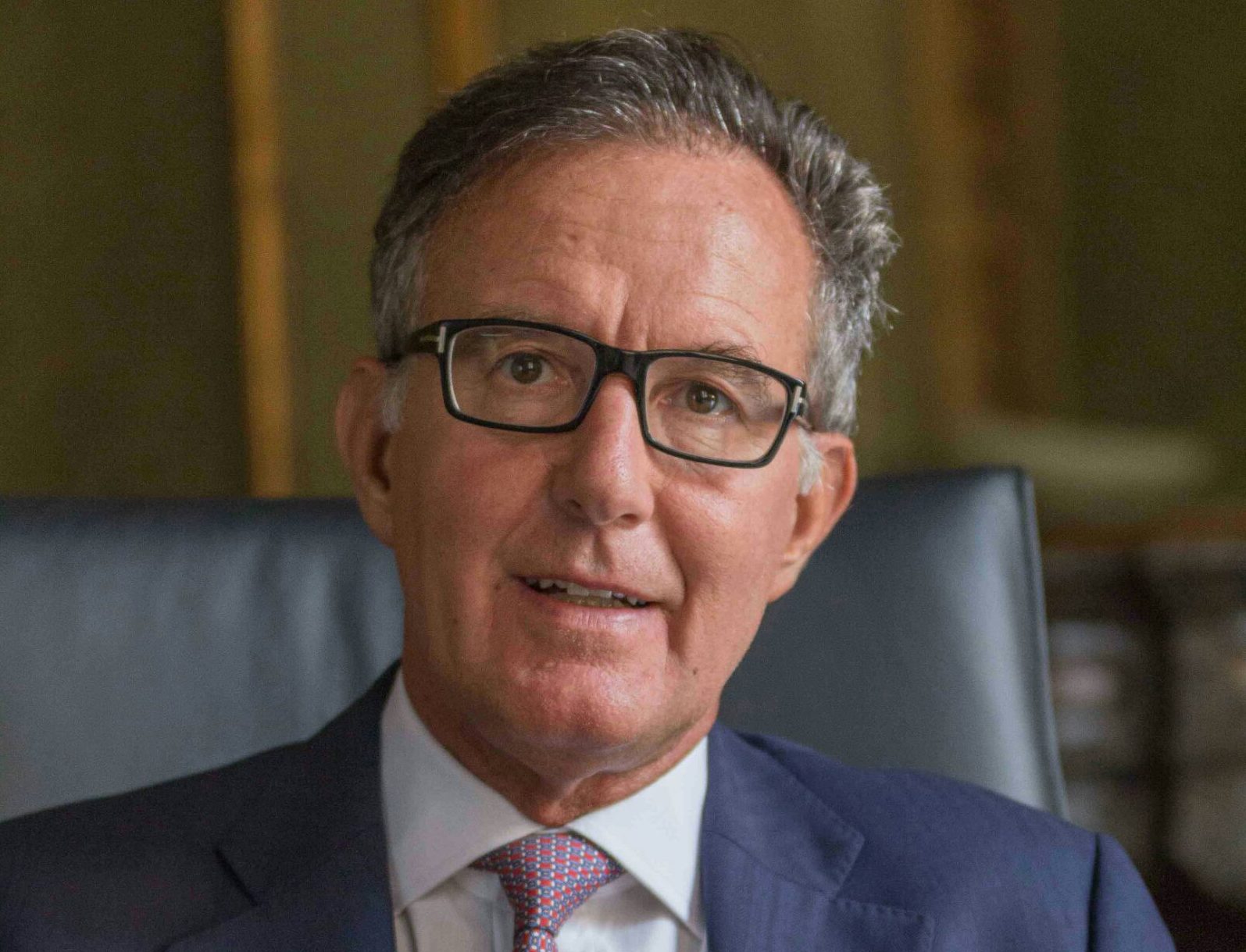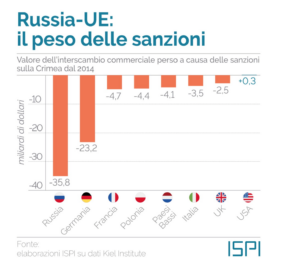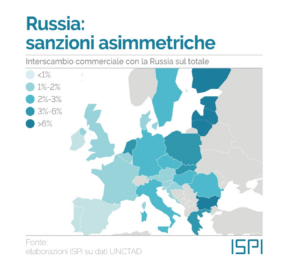Who will really pay for the anti-Russia sanctions. Magri’s analysis (Ispi)

What will be the effects of the upcoming sanctions against Russia. The analysis by Paolo Magri, vice president and director of Ispi (Institute for International Political Studies)
How will Russia move and what will be the real effects and recipients of the sanctions against Moscow? All the details in the analysis by Paolo Magri, director of ISPI.
Russia, Donbass and sanctions
After more than a month of negotiations, Russia seems to have dropped the mask on its real interests in Ukraine. Moscow recognized the independence of the two Donbass separatist republics of Lugansk and Donetsk and sent troops there. "Putin dropped the cards of the poker game he was leading with his impossible requests to NATO – said the vice president and director of ISPI Paolo Magri to TG1 -. In the end he gave up diplomacy and recognized the disputed regions of Ukraine , he sent soldiers as peacekeepers ”.
Crisis #Ukraine . How to interpret #Putin 's move? And what are the possible international consequences of this situation? @paolo_magri , vice president of the Institute of International Political Studies. @ispionline pic.twitter.com/gPdogojR1h
– Tg1 (@ Tg1Rai) February 22, 2022
What will happen with the sanctions on Russia
The one put in place by Putin would, in reality, be a scheme already seen . "Putin has, in the end, done in Donbass what he did in the past years with Transnistria, Moldova, Abkhazia, Ossetia and Georgia – remarked Magri during Coffee Break on La7 -. He recognizes pieces of countries he has sights on , he sends soldiers to be the peacekeepers that, in fact, they are there to garrison, and he leaves these conflicts frozen (those of Transnistria, Georgia and Ossetia have been so for years) to prevent that these countries can join NATO . Because if a country that wants to join NATO has a territorial dispute within it, a frozen conflict, it cannot enter NATO ".
The risks of growing tension and the chapter on sanctions against Russia
If Russia's actions were limited to the Donbass, the repercussions might not be devastating. “ The real reactions will depend on the next steps of Ukrainian President Zelenski – added Magri to TG1 -. If he stopped at the Donbass we would still have sanctions but not very harsh, such as those that would have been triggered if Putin had invaded Ukraine. If, on the other hand, he raised his stakes and there were to be a military confrontation between Russian and Ukrainian soldiers, the situation would become very complicated and all the scenarios of very heavy sanctions would be possible again ”.
Ukraine's reaction and the dangers of provocations
Nerves are also very tense among Ukrainian nationalists. " Zalenski has groups and bands of nationalists who are hard and pure – explained Magri on La7 -. The point is Zelenski's official reaction, on which all European countries will pressure to induce him to accept the status quo and not create further problems. But then we need to understand what the paramilitary and self-defense groups will do , and that is where the confrontation, the provocation can take place ”. After all, NATO has already made it clear, over and over again, that it will not intervene in support of Ukraine. “However – recalls Magri – NATO's second intervention in the Balkans was an intervention in a country that was not NATO, which did not threaten any NATO country and which was not even approved by the security council. So NATO's promises of non-intervention depend on what will happen in the future ”.
The impact of sanctions on European economies
Today the EU announced the sanctions , the first to leave was the British Prime Minister Boris Jonhson , then the USA will arrive. Sanctions produce secondary, collateral effects, even on the countries that impose them. “Here we are having implicit sanctions that are affecting all European countries . The sanctions create counter-sanctions and we all pay, especially those who have more trade – says prof. Paolo Magri during the TG1 special -. The stronger the sanctions the more effective they are but the more they affect those who impose them. The sanctions we are talking about these days (we are even thinking of boycotting oil and gas arriving from Russia) would certainly have a very strong impact on those who impose them ".
The results of sanctions in the past
In the past, the use of sanctions has not had a particularly positive effect. “Just think of the three countries most sanctioned to change their governments' posture: North Korea , Iran and Venezuela – adds Magri to CoffeeBreak -. Countries that continue to do the same things for which we have sanctioned them and have been sanctioning them for years ”.
The penalties we are already paying
Europe, and Italy in particular, is already paying a very high bill as a result of the animosities on the Ukrainian border. “ The harsher and more global the sanctions are, the more they hurt even those who issue them – continues Paolo Magri -. Here we have to be honest, we are talking about strong and heavy sanctions for the future, but we are already paying undeclared sanctions which are reflected in the increase in the price of energy. And we are all paying for them and they are very high. Italy has had to allocate 20 billion so far to support consumers and businesses for the increase in gas. When there were sanctions in 2014 for the invasion of Crimea, the cost was 4 billion . And here we have not yet started to impose sanctions, when that happens Russia will respond with counter-sanctions ”. The result of not having to pay everyone, too much, for a war that nobody wants? "There will be pressure on everyone so that the annexation of the Donbass goes well".

Concerns about the effect of the sanctions on Italy
Italy and Germany, as ISPI writes , are the most exposed countries , and therefore more cautious in resorting to the measures, however the impact would be felt differently in all European economies. “All the sanctions that indirectly impact on the energy market have a greater impact on the country that imports the most gas – said Premier Mario Draghi -. At the moment there is still no assessment of the quantitative impact of any sanctions, but it is known that certain sanctions would have more impact on Italy and less on other countries . Italy has only gas, it does not have nuclear power and coal and is more exposed. We are also studying how Italy can continue to be procured from other sources if those from Russia should fail ”.
Energy interdependence
Those who would not feel the weight of the sanctions are the United States , the same ones that are clamoring for them. The US enjoys total energy autonomy. “ The liquefied gas invoked as a solution to the problem would be sold by the USA – explains Magri during the transmission conducted by Monica Maggioni -. Europe is unable, if not at very high prices, to replace Russian oil and gas in the short term. You can try it in the medium term, a few months, a year or two, but the prices would skyrocket . So the likelihood that there is unanimity on the request for a boycott of Russian gas and oil is very unlikely ”.

Sanctions? All possible advantages for Russia
The sanctions could also cause another side effect: economic benefits for Russia . "It is likely that there will be a drop in Russian sales and our purchases, but this is not a loss for Russia because Russia sells less gas but at five times the price at which it was selling it before – underlines Magri -. In the last year, oil has risen to 100 dollars a barrel so in the last year Russia has quadrupled its reserves and accumulation in the sovereign wealth fund ”. Of course, if Russia abruptly interrupted the gas supply it would no longer be a credible seller but things change in the medium term. "In the medium term, Russia is making money from this crisis , not losing money," Magri says.
This is a machine translation from Italian language of a post published on Start Magazine at the URL https://www.startmag.it/primo-piano/sanzioni-anti-russia-magri-ispi/ on Tue, 22 Feb 2022 14:05:03 +0000.
